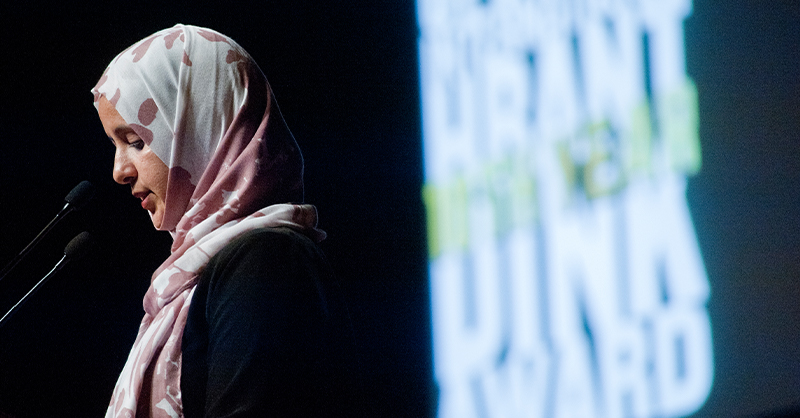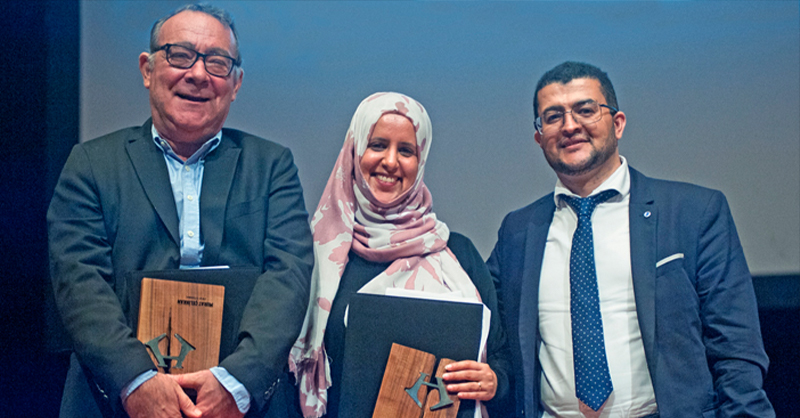
Mwatana Organization for Human Rights was established in 2013 by Radya al-Mutavakel and Abdulrashid al-Fakih in order to defend and protect human rights in Yemen. In this country, where the closure of air, land and sea ports have led to great difficulty in providing humanitarian aid as well as vital necessities such as food, medicine and fuel, and human rights violations such as forced disappearances, arbitrary arrests and the oppression of human rights defenders are rife, the Organization carries out field visits and studies, observation and documentation work with an independent team of young women and men in order to determine and put an end to such violations, and produce accurate, impartial information regarding them. In the light of the data collected, they carry out legal evaluations in accordance with international human rights law, conduct lobbying in order for them to be accepted and put into practice.
As it supports victims of human rights violations, it works to ensure that those responsible are identified and brought to justice, and to develop legislation and policies to prevent these violations from being repeated. Using films, brochures and social media, it works to raise public awareness of rights, and train specialists in the area of human rights. It plays a very important role in informing international public opinion on what is happening in Yemen.
The fuse war was lit in September 2014 when an armed group of Houthis captured the capital of San’a and began advancing toward the country’s second-largest city of Aden. In response to this, an international coalition under the leadership of Saudi Arabia attacked Houthi forces by air in March 2015. The Organization has provided documentation of human rights violations occurring during this ongoing armed conflict. In the civil war, which the United Nations has identified as “the world’s worst humanitarian crisis,” forces led by the United States and Saudi Arabia as well as Houthi attacks have killed thousands of civilians, women and children, injured countless more, and destroyed hospitals, homes, parks, marketplaces and schools. The Organization has documented these attacks and destruction and made it known to the public. In accordance with the Ottawa Treaty which Yemen signed in September 1998, it has demanded and continues working for the cessation of the use of land mines by Houthi forces, the detection of mine fields, the destruction of mines in stockpiles, the cleaning of mines still buried, and the payment of reparations to victims of the mines. It has worked to research and document the situation of journalists who disappeared in the course of duty, or were arbitrarily arrested. The reports it has prepared are used as a reference by Amnesty International and Human Rights Watch.
In a time when newly organizing civil society organizations in Yemen were silenced within the political polarization that began forming in 2011; when the country lost its independence as its capital Sana’a was captured by the Houthis in 2014, followed by the March 2015 military intervention by Saudi-led coalition forces; and a smear campaign was whipped up against independent human rights organizations by the conflicting sides social media and private networks in order to foment public bias against them, it has continued its work without interruption. In this environment, where the right to travel is severely limited, it has actively used its only remaining channel, the social media, in order to share reports of human rights violations in the country.

When we in Mwatana first received an Email saying that Mwatana has been chosen for the International Hrant Dink Award, we felt happy and proud to be chosen by a respectful Foundation that is based in Turkey and work hard for Human Rights and Justice. In spite of the very big differences on the situation between Yemen and Turkey, we still share many similar difficulties as civil society. Also, when we read more about Hrant himself and each person in the Jury, we even felt happier and prouder. So, thank you. I want to say congratulations to Hrant and Happy Birthday to his soul. With such family, team, friends and lovers he can't be dead. Yesterday and today, I had the chance to know more about him, about his values and his great influence in many people, honestly, I couldn't stop thinking of my father. The peaceful academic and politician man who worked all his life for the democratic, civil and justice state. He was assassinated in November 2014 while walking in the street, but the war in Yemen, the crazy toll of death, deprived us of celebrating his history, values and memories as he deserves.
Ladies and gentlemen, I came to you form a country where more than 22 million people need humanitarian aid and protection. This is almost all of us. Exactly - three-quarters of us -. I came to you from a country were 18 million people are food insecure and 8.4 million of these people do not know how they will obtain their next meal. Millions of Yemenis do not have access to safe drinking water. Treatable and preventable illnesses become a death sentence when local health services are not working and it is impossible to travel outside the country. Three quarters of displaced people are women and children and about 2 million children are out of school. 2,500 schools have been destroyed or are not being used for their original purpose.
We can summarize all of this, and much more of this in one famous sentence. Yemen is the worst humanitarian crisis in the world. However, we should always add to this sentence, that is not a natural crisis. It is a man-made crisis, a crisis caused by conflict.
As the conflict enters its fourth year in Yemen, horrible violations and war crimes have been committed against civilians and civilian objects. Unlawful airstrikes, blockade, indiscriminate shelling, arbitrary detention, forced disappearance, torture, attacking schools and hospitals, landmines, child recruitment, and much more. If you are now asking who exactly committed these violations in Yemen, I will answer, who didn't?
It is the Saudi and Emirati led coalition and forces and armed groups loyal to it, Houthi and ex-president Saleh armed groups, government of president Hadi and forces and armed groups loyal to it. Also, countries like, the US, the UK and France who are fueling the war by selling weapons to some countries which are involved in serious violations in Yemen, particularly, Saudi Arabia and Untied Arab Emirates. whenever you hear about war in Yemen and all parties to the conflict, you should always remember that there are no heroes, there are only criminals and victims.
In spite of all of this, hope is always there, and peace in Yemen is always possible. It is the desire of most Yemeni ordinary people whom until now refuse to be part of the conflict. They are still civilians and have a huge desire to live.
Those people are our strength in Mwatana. We work hard because we believe that they deserve better life and they deserve justice. It is not easy to be an independent Human rights NGO in a middle of armed groups and your neighbor is Saudi Arabia. However, it is more difficult not to do anything for civilians in such situation. We choose Human Rights to be our road toward accountability, justice and peace. Documenting violations, providing legal assistance, and doing lots of advocacy seems like digging the wall in a middle of a horrible war. However, we feel that our honest work can shake the wall of war and one day it will collapse. Peace will come one day and Mwatana will keep working for a society where justice and full access to rights is guaranteed to everyone.
Let me take you quickly to the beginning of Mwatana. We had been trying to get the legal permission for Mwatana since 2007, and because of our human right work as individuals the ministry of social affairs never gave it to us. Finally, in 2013 we got the official permit for Mwatana and by then, we were only two. Abdulrasheed Alfaqih - my colleague and husband - and me. Today, we are a big family. We are 70. 70 independent, neutral, and brave men and women. Our main office is in Sana'a but we also have field team all over Yemen. They are all youth. I might be the oldest.
From here I want to say thank you to each one of them. Thank you for the hard work you are doing in such a very difficult situation. Thank you for being patient in front of all the hate campaigns which largely affect all of you. Thank you for being brave and strong in face of the risk you face daily in your lives and work. Mwatana deserved this award because of all of you.
I am really sad that our colleague Kamal Al Shawish , Mwatana's field research assistant, will not be celebrating this day with us because he has been detained in Hodaidah and forcibly disappeared by Houthi armed group since 14 August 2018. One month and one day until now.
Yesterday when I listened to the representative of the great turkey gathering called (Saturday mothers), I felt very sad. I hugged her and didn't know what to say. It is always difficult to say anything for those whose loved once are forcibly disappeared. I know what that mean. Thousands of Yemenis know what that mean. Arbitrary detention, forced disappearance, and torture is one of the heaviest files in Yemen and all authorities since many years until today are involved in this file. Mothers, wives, and women in general are the most affected by these horrible violations. In Yemen also, there is a group of great women called (mothers of abductees).
We at Mwatana are working very hard to push for releasing those who are detained and disappeared all over Yemen and we have lawyers in 7 governorates who are daily following many cases. In spite of all the darkness, there are some successful stories that encourage us to go forward.
At the end of my speech I demand freedom all those who are arbitrarily detained and forcibly disappeared in Yemen, Turkey and all over the world.
